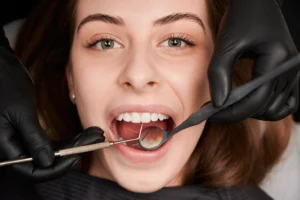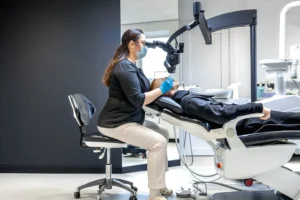Table of Contents
If you’ve ever asked yourself, How often should you see the dentist, you’re not alone. Most people know regular checkups are important, but few understand why the timing of those visits matters so much. At Hardin Family Dental in Hardin, MT, our dental team often hears this question from new patients — and the answer isn’t as simple as “twice a year.”
Your oral health needs are unique, and how frequently you should visit depends on your age, habits, health history, and risk factors. In this guide, we’ll break down expert recommendations, explain why timing is so critical, and help you build a personalized schedule that keeps your teeth and gums healthy for life.
Why Regular Dental Visits Are So Important
Many people delay seeing their dentist until something hurts. But by the time pain occurs, the issue is often more advanced — and treatment can be more complex. Regular checkups allow our dental team to catch problems early, often before you even notice symptoms.
Routine dental visits help detect cavities, gum disease, and oral cancer early, which can make treatment easier, faster, and more successful. They’re also key to preventing issues from developing in the first place.
Even if your teeth look and feel fine, many oral health conditions progress silently. Gum disease, for example, often starts without pain or obvious signs, but if left untreated, it can lead to tooth loss and increase the risk of heart disease and other health complications.
How Often Should You See the Dentist?
The classic recommendation is to visit your dental team every six months. This twice-yearly schedule allows us to monitor your oral health, remove plaque and tartar that brushing and flossing can’t reach, and catch small issues before they become major concerns.
However, not everyone fits into the same schedule. Here’s how it breaks down by patient type:
Adults With Good Oral Health
- Frequency: Every 6 months
- Why: This schedule maintains healthy teeth and gums, provides professional cleanings, and ensures regular screenings for potential problems.
Patients With Gum Disease or High Risk
- Frequency: Every 3–4 months
- Why: Periodontal disease can progress quickly without close monitoring. More frequent visits help control infection and prevent tooth loss.
Children and Teens
- Frequency: Every 6 months (sometimes more during growth or orthodontic treatment)
- Why: Early detection of cavities and alignment issues is critical. Preventive care like sealants and fluoride treatments are most effective when delivered consistently.
Seniors
- Frequency: Every 4–6 months
- Why: Age-related changes such as gum recession, dry mouth, or bone loss require closer attention.
Routine visits are just one part of maintaining lifelong oral health. Our full General and Family Dentistry Guide explores all the services and preventive care options we offer at Hardin Family Dental.
Factors That Influence How Often You Should Schedule a Visit
There’s no one-size-fits-all answer. Your personal health, habits, and lifestyle all play a role in determining how often should you see the dentist. Here are some key factors that may increase your need for more frequent visits:
1. Gum Health
If you’ve been diagnosed with periodontal disease or have a history of bleeding gums, you may need visits every three to four months to keep the condition under control.
2. Cavity Risk
Some people are more prone to cavities due to genetics, diet, or oral hygiene habits. More frequent checkups allow our dental team to identify early decay and recommend preventive treatments like fluoride or sealants.
3. Smoking or Tobacco Use
Tobacco products increase the risk of gum disease, oral cancer, and delayed healing. Regular exams help detect these problems early and reduce long-term damage.
4. Medical Conditions
Certain conditions like diabetes, autoimmune disorders, or dry mouth can affect oral health. Regular dental visits are essential for monitoring changes and preventing complications.
5. Pregnancy
Hormonal changes during pregnancy can increase the risk of gum disease and other issues. Pregnant patients may benefit from an additional cleaning or checkup during pregnancy.
6. Orthodontic Treatment
If you’re undergoing treatment like Invisalign® or braces, more frequent visits are necessary to track progress and make adjustments.
7. History of Dental Work
Patients with crowns, bridges, implants, or dentures should visit regularly to ensure everything remains stable and functional.
What Happens During a Routine Dental Visit
If it’s been a while since your last appointment, knowing what happens during a checkup can help you feel more prepared. Here’s what a typical visit includes:
- Review of your medical and dental history
We’ll discuss any health changes, medications, or symptoms since your last visit. - Comprehensive examination
Our dentists will check your teeth, gums, bite, and soft tissues for signs of disease or other issues. - X-rays if needed
These images allow us to detect cavities, bone loss, or hidden concerns that aren’t visible during the exam. - Professional cleaning
A hygienist will remove plaque and tartar, polish your teeth, and provide tips for better home care. - Personalized recommendations
We’ll discuss your oral health status and create a plan tailored to your needs — including how often you should return.
The Benefits of Sticking to a Dental Schedule
Maintaining regular dental appointments does more than keep your smile bright. It impacts your overall health too. Here are some key benefits:
- Early detection: Problems are treated before they become painful or expensive.
- Lower treatment costs: Preventive care is far less costly than complex procedures.
- Better overall health: Oral health is linked to conditions like heart disease and diabetes.
- Confidence: A clean, healthy smile boosts your confidence and self-esteem.
The Mayo Clinic notes that oral health is a window into your overall health — regular dental visits can even help detect early signs of systemic conditions.
Tips for Keeping Up With Dental Visits
Consistency is key. Here are a few ways to make dental appointments part of your routine:
- Book your next visit before you leave the office so you don’t forget.
- Add appointments to your calendar immediately and set reminders.
- Schedule family appointments together to make it easier to stay on track.
- Talk with our team if cost or time is a barrier — we’ll help find a solution that works for you.
Final Thoughts: Your Smile Deserves Consistent Care
So, how often should you see the dentist? For most people, every six months is ideal, but some need more frequent visits to stay ahead of potential problems. What matters most is creating a schedule that works for you — one that keeps your smile healthy, your confidence high, and your overall health in check.
At Hardin Family Dental in Hardin, MT, our goal is to make those visits comfortable, convenient, and effective. Whether it’s been six months or six years since your last checkup, there’s no better time to schedule an appointment than now.
Ready to Book Your Next Appointment?
Your healthiest smile starts with regular visits. Contact Hardin Family Dental today to schedule your next checkup and let our dental team help you create a personalized care plan for long-term oral health.



